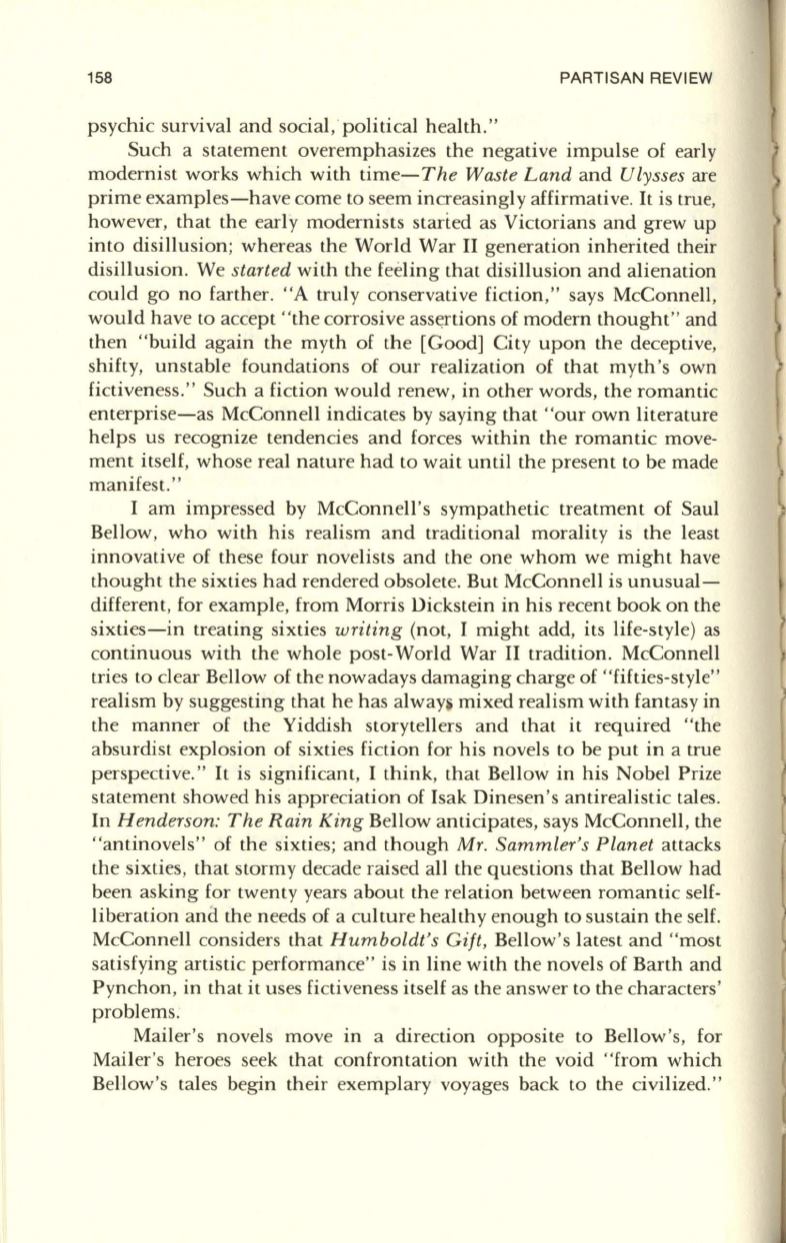
158
PARTISAN REVIEW
psychic survival and social, political health."
Such a statement overemphasizes the negative impulse of early
modernist works which with
time-The Waste Land
and
Ulysses
are
prime examples-have come to seem increasingly affirmative.
It
is true,
however, that the early modernists started as Victorians and grew up
into disillusion; whereas the World War II generation inherited their
disillusion. We
started
with the feeling that disillusion and alienation
could go no farther. "A truly conservative fiction," says McConnell,
would have to accept "the corrosive assertions of modern thought" and
then "build again the myth of the [Good] City upon the deceptive,
shifty, unstable foundations of our realization of that myth's own
fictiveness." Such a fiction would renew, in other words, the romantic
enterprise-as McConnell indicates by saying that "our own literature
helps us recognize tendencies and forces within the romantic move-
ment itself, whose real nature had to wait until the present to be made
manifest. "
I am impressed by McConnell's sympathetic treatment of Saul
Bellow, who with his realism and traditional morality is the least
innovative of these four novelists and the one whom we might have
thought the sixties had rendered obsolete. But McConnell is unusual–
different, for example, from Morris Dickstein in his recent book on the
sixties-in treating sixties
writing
(not, I might add, its life-style) as
continuous with the whole post-World War II tradition. McConnell
tries to clear Bellow of the nowadays damaging charge of "fifties-style"
realism by suggesting that he has
alway~
mixed realism with fantasy in
the manner of the Yiddish storytellers and that it required "the
absurdist explosion of sixties fiction for his novels to be put in a true
perspective." It is significant, I think, that Bellow in his Nobel Prize
statement showed his appreciation of Isak Dinesen's antirealistic tales.
In
Henderson: The Rain King
Bellow anticipates, says McConnell, the
"antinovels" of the sixties; and though
Mr. Sammler's Planet
attacks
the sixties, that stormy decade raised all the questions that Bellow had
been asking for twenty years about the relation between romantic self–
liberation and the needs of a culture healthy enough to sustain the self.
McConnell considers that
Humboldt's Gift,
Bellow's latest and "most
satisfying artistic performance" is in line with the novels of Barth and
Pynchon, in that it uses fictiveness itself as the answer to the characters'
problems.
Mailer's novels move in a direction opposite to Bellow's, for
Mailer's heroes seek that confrontation with the void "from which
Bellow's tales begin their exemplary voyages back to the civilized."


